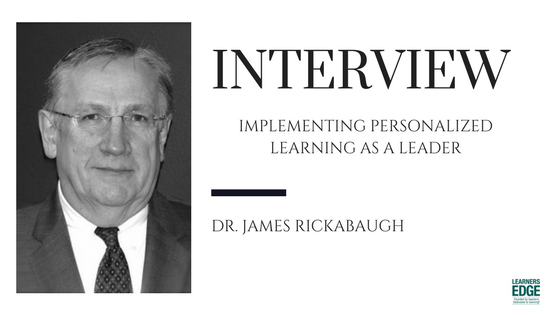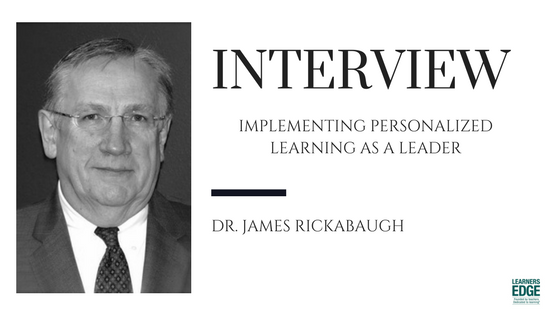
Dr. James Rickabaugh, the Director of theInstitute for Personalized Learning(IPL), wrote the book,Tapping the Power of Personalized Learning: A Roadmap for School Leaders. It is an excellent text for principals and other administrators who may be considering personalized learning for their school building or district. The book reviews research that has been done by the institute, provides a complete introduction to personalized learning and includes strategies and activities to move toward implementation.It is also featured in our new Learners Edge course,5054: Navigating Personalized Learning as a Leader.
I had the pleasure of interviewing Dr.Rickabaughtobring you a few key points to think about as you move toward personalized learning.Enjoy!
Keely: Dr. Rickabaugh, what first interested you about personalized learning and why do you think personalized learning is of value? Dr. Rickabaugh: One of the early drivers for me was when I left the Superintendency at Burnsville…I went to work for a company that provided very hands-on simulation learning for primarily elementary and middle school students. The idea was summer and after-school experiences, with units like medical, biomedical, aeronautics, and a whole host of very engaging topics. What was so interesting was to see students that sat all day completely bored all of a sudden coming alive at the end of the day during a part of the day when they ought to be tired. They are suddenly most energized! In the summer, they were looking forward to coming to a summer experience that was about education. One of the things that struck me was that the learning was purposeful. They understood why they were doing it. They had an opportunity to have some say within it, make some choices within it, and to see a product, an outcome. Things that are sadly too infrequent in many classrooms. Keely: Let’s imagine a school leader has learned about personalized learning, maybe read your book, or even taken our course. What is the first thing they must do (and why) to begin the implementation process in their school or district? Dr.Rickabaugh: Start the conversation with “WHY.” If we are really clear about why we need to do this, it can drive the rest of the work. So much about reform in education was about what we need to do differently or how we need to do it differently without a thorough discussion of “why.” The answers to the why itself are absolutely compelling. One is, we are spending a lot of money on education and not getting what we want and we are putting more pressure on educators and not getting what we want. What if we thought about the design? The future for which we are preparing today’s learners isn’t the future their parents or grandparents had. To what extent are we today preparing learners for that world because that means they have to take responsibility for their own learning. They’ve got to be able to work without close supervision. They have to be able to produce quality work on a consistent basis. They have to be able to describe why what they are doing has value for someone who may pay for it. For me, the why is the world for which we are preparing learners is changing rapidly, and the old industrial system doesn’t support it. Keely: I know from experience that it can be challenging to get colleagues on board with new initiatives. What advice do you have on gaining “buy-in” for personalized learning within a school staff? Dr. Rickabaugh: In my experience, by and large, educators want their children to be successful, and they want to feel like their work is impactful. One of the gifts of this approach is that while it’s not less work, the work is different in ways that I hear from teachers all the time. “I go home at night tired just like I always have except that I feel like I am making a difference.” “I can specifically point to learners who are growing, whose capacity to learn and commitment to learning is bigger than it was the day before, and that’s why I want to do this work.” It also puts me in a position to have a very powerful relationship with learners around their learning as opposed to a relationship where I am the source of knowledge. There is a shift from an instruction driven environment into a learning-driven environment. It’s all about how my instruction, how my encouragement, how my coaching, how all of that builds learner capacity as opposed to pouring knowledge into an empty head that I am going to later assess to see if it’s still there. Keely: What are the most common roadblocks you see in implementation and how can a leader overcome the roadblocks? Dr. Rickabaugh: Accountability in the old model is “did you teach it well?” The accountability in the new model is “did learners learn it?” In the old model, you can hide behind, “I taught is well. They just didn’t learn it, therefore, it’s not my responsibility.” In this world, it’s “Learner, we are in this together. We’ve got to make a difference together. I can’t be successful if you are not successful, so let’s figure that out.” That difference in the relationship, for many educators, feels like letting go of control. What they don’t realize is, the exchange is far more influence. Their impact is far greater. The old definition of control is that I’ve got to let go of something that in the past, I hung onto. A number of strategies can get you there. One is just having an honest conversation about what is more important: instruction or learning? Most people, before long, will say, learning is more important. Well then, instruction needs to be a flexible resource in service of that. Another strategy is to just have them go and watch colleagues do this kind of work and say, for the moment, don’t watch your colleague, watch the learner. They will come back and say, “…I can’t believe how engaged those kids were.” Or “I can’t believe the questions they are asking.” In fact, I’ve had high school teachers go to elementary schools and say “I never believed that my high school students could do what I am seeing fifth-grade students do.” There is so much potential there with a different approach. Keely: Is there anything else from a leadership standpoint you’d like to share?
Dr. Rickabaugh: I’ll go back to three points.
- If we don’t change the experience of the learner, we cannot expect a change in outcomes. Changing what we do as adults is relevant only if it changes the experience of the learner.
- Our work ought to be about nurturing powerful learners, not just good students. We spend a lot of time helping kids become good students forgetting that the world we are preparing them for rewards them for being good learners not just being taught, but being able to learn.
- The day we found full success is when learners see themselves as their own best teacher. We’ve developed in them the skill set, the curiosity, the strategies, the competencies, that they can go into a world saying, “If a teacher emerges great, but if they don’t, I know how to learn. I’ve got strategies to know what to do when I don’t know what to do.” Keely: I’d like to thank Dr. Rickabaugh for his time and commitment to the practice of education. If you’d like to read extended versions of Dr. Rickabaugh’s responses, click here.
Do you want to develop expert learners and truly prepare them for the future? Personalized Learning can get you there! If you would like to learn more, check out our two new courses on this topic:
- 5016:Developing Expert Learners Through Personalized Learning
- 5054: Navigating Personalized Learning as a Leader
Resources:
- Bray, B., & McClaskey, K. (2017).How to personalize learning: A practical guide for getting started and going deeper. Thousand Oaks, CA: Corwin.
- Rickabaugh, J. (2016).Tapping the power of personalized learning: A roadmap for school leaders. Alexandria, VA: ASCD.
***







